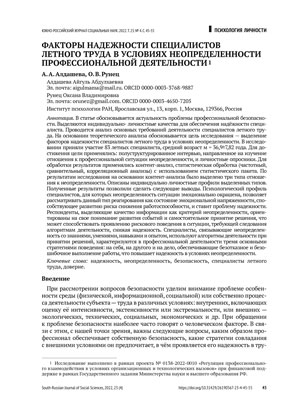Abstract
Relevance for professional safety is substantiated in this paper. Individual personality characteristics to ensure the reliability of a specialist are highlighted. The analysis of basic operational standards for flight specialists is carried out. On the basis of this theoretical analysis the goal of the research is substantiated: it is the identification of reliability factors of flight specialists in conditions of ambiguity. A total of 83 flight specialists (mean age m = 36.9±7.82 years) participated in the study. To achieve the goal, semi-structured interviews with the question intended to explore the attitude regarding an occupational uncertainty situation, as well as personal questionnaires, were applied. To process the results, the following methods were used: content analysis, statistical processing (frequency, comparative, and correlation analyses) involving a statistical package. As a result, three types of attitude to uncertainty were identified through content analysis. Besides, individual personality profiles of the selected types were described. The results obtained made it possible to draw the following conclusions. A psychological profile of the specialists, for whom situational uncertainty has an emotional impact, makes it possible to regard this type of response as a state of “emotional tension,” which contributes to the risk of reduced performance and poses a problem of reliability. Respondents who emphasize the quality of information as an uncertainty criterion are oriented toward their own perception of events and their independent decision-making, which can encourage high-risk behavior when a situation demands them to follow the algorithms of their activity, thus lowering reliability level. Professionals who associate uncertainty with their knowledge, competencies, skills and experience, use activity algorithms while making decisions, and are characterized in their professional activities by three basic behavior strategies: on oneself, on another person as well as on the case, thus ensuring faultless and error-free work, which improves reliability under uncertainty conditions.
Keywords
Funding information
The study was carried out with the financial support of the Ministry of Science and Higher Education of the Russian Federation within the state task No. 0138–2022–0010 “Regulation of professional interaction in the context of organizational and technological challenges”.
References
Алдашева, А.А. (2016). Доверие профессионала к себе в пространстве профессиональной деятельности. Социальные и гуманитарные науки на Дальнем Востоке, 3(51), 65–70.
Алмаев, Н.А. (2012). Применение контент-анализа в исследованиях личности. Москва: Издательство «Институт психологии РАН».
Беллман, Р., Заде, Л. (1976). Принятие решений в расплывчатых условиях. В И.Ф. Шахнов, Г.С. Поспелов (ред.) Сборник переводов «Вопросы анализа и процедуры принятия решений» (с. 172–215). Москва: Изд-во «МИР».
Благинин, А.А., Синельников, С.Н., Смольянинова, С.В. (2017). Особенности оценки функционального состояния у операторов с учетом индивидуальных психологических характеристик. Физиология человека, 43(1), 11–17.
Бодров, В.А., Орлов, В.Я. (1998). Психология и надежность: человек в системах управления техникой. Москва: Издательство «Институт психологии РАН».
Бучельников, О.Ю., Гришков, А.А., Мальчинский, Ф.В., Медяникова, Л.М., Некрасов, С.Д. (2018). Моделирование системы отбора летчиков-инструкторов. Южно-российский журнал социальных наук, 19(4), 147–163.
Зеленова, М.Е., Лекалов, А.А., Лим, В.С., Костенко, Е.В. (2018). Профессионализм, личностные особенности и психологическое здоровье летчиков. В А.Н. Занковский, А.Л. Журавлев (ред.) Современное состояние и перспективы развития психологии труда и организационной психологии (с. 509–528). Москва: Издательство «Институт психологии РАН».
Канеман, Д., Словик, П., Тверски, А. (2005). Принятие решений в неопределенности: Правила и предубеждения. Харьков: Издательство Институт прикладной психологии «Гуманитарный Центр».
Карпов, А.В. (2014). Психология принятия решений в профессиональной деятельности. Ярославль: Ярославский государственный университет им. П.Г. Демидова.
Корнилова, Т.В. (2003). Психология риска и принятия решений. Москва: Аспект пресс.
Ларичев, О.И. (2002). Теория и методы принятия решений. Москва: Логос.
Лукинова М.Г., Щербакова Е.А. (2019). Профессионально важные качества курсантов третьего года обучения: структура личностных качеств. Южно-российский журнал социальных наук, 20(1), 152–164.
Лустина, Е.А. (1981). Преодоление ситуации неопределенности в процессах мышления и воображения. Вопросы психологии, 5, 122. Режим доступа http://www.voppsy.ru/issues/1982/825/825122.htm
Небылицын, В.Д. (1964). Надежность работы оператора в сложной системе управления. В А.Н. Леонтьев, В.П. Зинченко, Д.Ю. Панова (ред.) Инженерная психология (с. 358–367). Москва: МГУ
Павлова, Н.С., Сергиенко, Е.А. (2016). Субъектная и личностная регуляция поведения как проявление индивидуальности человека. Психологический журнал, 37(2), 43–56.
Петровский, А.Б. (2019). Групповой вербальный анализ решений. Москва: Наука.
Пономаренко, В.А. (2019). Психология духовности профессионала. Москва, Саратов: ПЕР СЭ, Ай Пи Эр Медиа.
Райфа, Г. (1977). Анализ решений (введение в проблему выбора в условиях неопределенности). Москва: Наука.
Ромек, В.Г. (2007). Тренинг уверенности в межличностных отношениях. Санкт-Петербург: Речь.
Толстова, О.Н. Хвостова, С.Л. (2018). Изучение личностных качеств при прогнозировании профессиональной успешности курсантов летного училища. В Б.Н. Котива (ред.) Современные противоречия и направления развития авиационной и космической медицины: Материалы научно-практической конференции, посвященной 60‑летию кафедры авиационной и космической медицины Военно-медицинской академии имени С.М. Кирова, Санкт-Петербург, 21–22 ноября 2018 года (с. 269–274). Санкт-Петербург: Военно-медицинская академия имени С.М. Кирова.
Ясько, Б.А. (2005). Психология личности и труда врача: курс лекций. Ростов-на-Дону: Издательство Феникс.
Bascetta, L., Ferretti. G. (2019). Ensuring Safety in Hands-on Control through Stability Analysis of the Human-robot Interaction. Robotics and Computer-Integrated Manufacturing, 57. 197–212. DOI: 10.1016/j.rcim.2018.12.003
Busemeyer, J.R., et al. (2019). Cognitive and Neural Bases of Multi-attribute, Multi-alternative, Value-based Decisions. Trends Cognitive Scince, 23(3). DOI: 10.1016/j.tics.2018.12.003
Kim, W., Peternel, L., Lorenzini, M., Babič, J., Ajoudani, A. (2021). A Human-Robot Collaboration Framework for Improving Ergonomics During Dexterous Operation of Power Tools. Robotics and Computer-Integrated Manufacturing, 68. 102084. DOI: 10.1016/j.rcim.2020.102084.
Kroemer, K.H.E., Kroemer, H.J., Kroemer-Elbert, K.E. (2020). Engineering Physiology: Bases of Human Factors Engineering. Berlin: Springer.
Orlove, В., Shwom, R., Markowitz, E., Cheong, S-M. (2020). Climate Decision-Making. Annual Review of Environment and Resources, 45(1), 271–303. DOI: 10.1146/annurev-environ‑012320-085130
Skagerlund, K, Forsblad, M, Slovic, P, Västfjäll, D. (2020). The Affect Heuristic and Risk Perception – Stability Across Elicitation Methods and Individual Cognitive Abilities. Frontiers in Psychology, 11, 970. DOI: 10.3389/fpsyg.2020.00970
Stanton, N.A., Salmon, P.M., Rafferty, L.A., Walker, G.H. (2017). Human Factors Methods. A Practical Guide for Engineering and Design. 2nd Edition. NY: Routledge. DOI: 10.4324/9781351156325
Quinn, R.E. (1988). Beyond Rational Management. San Francisco: Jossey-Bass.


